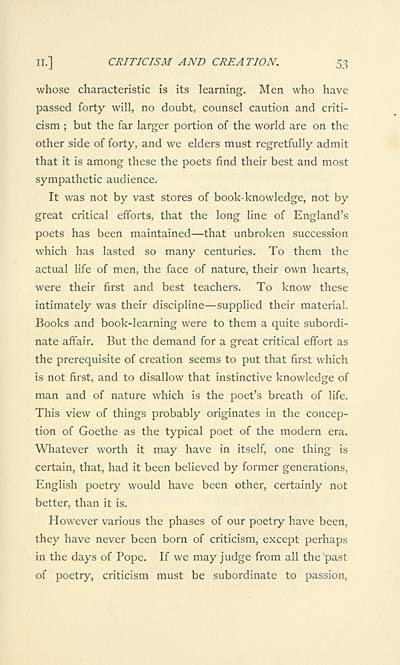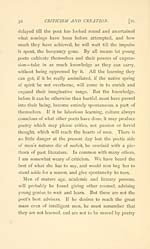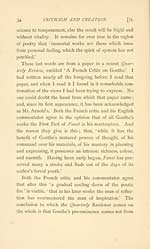Download files
Complete book:
Individual page:
Thumbnail gallery: Grid view | List view

II.] CRITICISM AND CREATION. ^7^
whose characteristic is its learning. Men who have
passed forty will, no doubt, counsel caution and criti-
cism ; but the far larger portion of the world are on the
other side of forty, and we elders must regretfully admit
that it is among these the poets find their best and most
sympathetic audience.
It was not by vast stores of book-knowledge, not by
great critical efforts, that the long line of England's
poets has been maintained — that unbroken succession
which has lasted so many centuries. To them the
actual life of men, the face of nature, their own hearts,
were their first and best teachers. To know these
intimately was their discipline — supplied their material.
Books and book-learning were to them a quite subordi-
nate affair. But the demand for a great critical effort as
the prerequisite of creation seems to put that first which
is not first, and to disallow that instinctive knowledge of
man and of nature which is the poet's breath of life.
This view of things probably originates in the concep-
tion of Goethe as the typical poet of the modern era.
Whatever worth it may have in itself, one thing is
certain, that, had it been believed by former generations,
English poetry would have been other, certainly not
better, than it is.
However various the phases of our poetry have been,
they have never been born of criticism, except perhaps
in the days of Pope. If we may judge from all the past
of poetry, criticism must be subordinate to passion,
whose characteristic is its learning. Men who have
passed forty will, no doubt, counsel caution and criti-
cism ; but the far larger portion of the world are on the
other side of forty, and we elders must regretfully admit
that it is among these the poets find their best and most
sympathetic audience.
It was not by vast stores of book-knowledge, not by
great critical efforts, that the long line of England's
poets has been maintained — that unbroken succession
which has lasted so many centuries. To them the
actual life of men, the face of nature, their own hearts,
were their first and best teachers. To know these
intimately was their discipline — supplied their material.
Books and book-learning were to them a quite subordi-
nate affair. But the demand for a great critical effort as
the prerequisite of creation seems to put that first which
is not first, and to disallow that instinctive knowledge of
man and of nature which is the poet's breath of life.
This view of things probably originates in the concep-
tion of Goethe as the typical poet of the modern era.
Whatever worth it may have in itself, one thing is
certain, that, had it been believed by former generations,
English poetry would have been other, certainly not
better, than it is.
However various the phases of our poetry have been,
they have never been born of criticism, except perhaps
in the days of Pope. If we may judge from all the past
of poetry, criticism must be subordinate to passion,
Set display mode to: Large image | Transcription
Images and transcriptions on this page, including medium image downloads, may be used under the Creative Commons Attribution 4.0 International Licence unless otherwise stated. ![]()
| Early Gaelic Book Collections > Ossian Collection > Aspects of poetry > (69) |
|---|
| Permanent URL | https://digital.nls.uk/78386100 |
|---|
| Description | Selected books from the Ossian Collection of 327 volumes, originally assembled by J. Norman Methven of Perth. Different editions and translations of James MacPherson's epic poem 'Ossian', some with a map of the 'Kingdom of Connor'. Also secondary material relating to Ossianic poetry and the Ossian controversy. |
|---|
| Description | Selected items from five 'Special and Named Printed Collections'. Includes books in Gaelic and other Celtic languages, works about the Gaels, their languages, literature, culture and history. |
|---|

